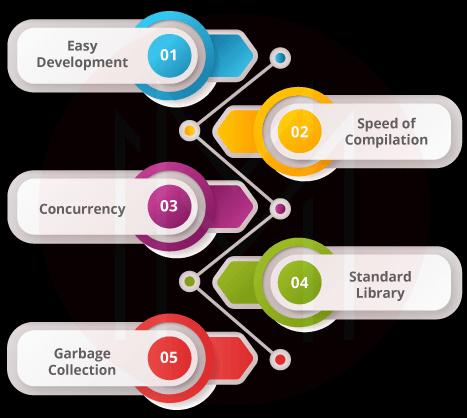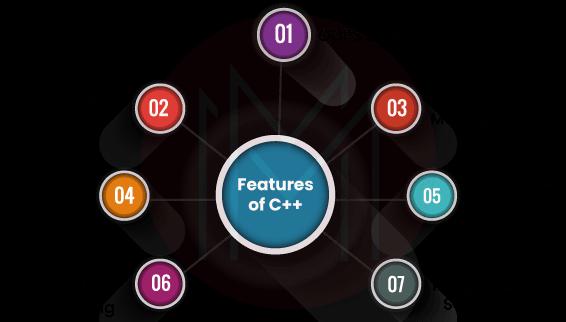Be it a team or an individual developer, they would like to build software applications in a way that offers the best experience to users. On that note, every developer strives hard to accurately choose the right tool to meet the application requirements and build effective applications. Choosing the right language or tool is a prime task for developers before beginning a software project to attain the desired outputs.
As we all know, Golang and C++ are the two widely used languages for software development. Sometimes, developers may confuse about which one to choose to write a program for building applications. Or they may be confused about which one is better than the other. If you are one among them, no worries. This blog unlocks the answer to this question.
Right! This blog compares Golang and C++ languages in terms of their features, pros and cons, similarities, and differences.
Golang Vs. C++ - Table Of Content
What is Golang?
Golang is an open-source, easy-to-learn, and multipurpose programming language developed by Google. Not just that, it is a simple, statically typed, and compiled programming language. Know that Golang is the latest language when compared to C++. Software developers prefer it since it has many features such as – simplicity, portability, performance, and readability. The great thing about Golang is that it has inbuilt concurrency options. In return, this feature helps simplify the scaling requirements of large-scale applications.
With Golang, you can build reliable and maintainable codes. That’s why it is primarily used for system programming. No wonder you can quickly build cloud applications using Golang since it uses low memory and CPU utilisation. Also, it is one of the preferred languages for web application development since it has capabilities such as – simple constructs and fast execution speed. Further, Golang is famous for writing codes for microservices and making command lines.
Who uses Golang?
Golang can be used for software development, server-side programming, cloud-based programming, game development, and many more. Also, companies such as Google, Cloudfare, MongoDB, Netflix, Dropbox, SoundCloud, Couchbase, Twitch, and Uber widely use Golang. What’s more! Applications such as Terraform, Docker, OpenShift, Kubernetes, and Juju are built by Golang.
| Looking forward to become a master in Programming & Frameworks Courses? Check out the "Golang Training" and get certified today. |
What are the Key features of Golang?
Here are a few main features of Golang that will help you know more about its capabilities of Golang.
Easy Development: Golang comes with a simple syntax. It is an easy-to-understand as well as easy-to-use language. That’s why it is known as a programmer-friendly language. With Golang, you can make rapid application development. And it can be done by integrating with debugging tools and deployment environments.
Speed of Compilation: Compilation speed is faster in Golang when compared with other programming languages such as Python, C++, and Java. No wonder you can compile Go codes within a few seconds. This is because of the simple syntax of the language. Once the compilation is over, you will get an executable binary file that won’t have any external dependencies at all. Generally, you can run compiled codes faster than interpreted codes. That’s why Golang achieves high execution speed.
Concurrency: It is a stellar feature of Golang. Golang uses a multi-core CPU setup to execute functions simultaneously. Additionally, Golang uses Goroutines and channels to run functions asynchronously. Know that Goroutines are lightweight tools used to support concurrency. And channels help Goroutines to communicate with each other. Moreover, you can scale applications efficiently using concurrency options.
Standard Library: Golang has a powerful standard library constructed of distributed packages. There are a lot of packages in the library that simplifies the process of writing codes for developers. The packages include HTTP Servers and clients, JSON/XML parsing, security/encryption functionalities, SQL Databases, and more. Mainly, this library eliminates developers’ dependency on third-party packages by providing all the packages required for developing programs.
Garbage Collection: It is one of the prime features of Golang. The garbage collection mechanism is used for making effective memory management. For this, Golang uses a mark and sweep collector. In a way, garbage collection eases the task of concurrent programming. In short, Golang helps to manage complex programs easily.

What are the Advantages and Drawbacks of Golang?
Golang has many advantages over other programming languages. Let’s take a look at them below:
- Golang has an easy learning curve
- Go codes are easily readable. Over and above, an easy-to-use tool
- Golang has good documentation, which will support developers significantly.
- It compiles and executes codes at speed
- Golang is portable. It means that it will work on all platforms
- It has automatic garbage collection
- It performs independent error handling
- Golang reduces runtime errors and dependencies.
- It has good memory safety and management
- Golang supports scalability
- It has a large user community.
Drawbacks of Golang:
No wonder Golang has a few drawbacks as well. Here is the list of drawbacks. Let’s have a look at them.
- Golang doesn’t support abstractions
- It doesn’t require Virtual Machines
- It lacks default values for arguments as well as function overheading
- It lacks generic programming
- Dependency management is not good in Golang
What is C++?
C++ is one of the general purpose, mid-level, and OOPS-based programming languages created in Bell laboratories. Know that it is the superset of the C language. In other words, it is the extension of the C language. C++ is an OOPS-based language that widely uses objects and functions in programs. With C++, you can create fast and portable programs for large-scale applications. It offers reasonable control over memory and system resources in addition to good flexibility and scalability. Furthermore, C++ is portable, so it can work on any platform seamlessly.
Who uses C++?
C++ can be used to develop software, GUIs, web browsers, databases, and game applications. And you can use the C++ language for desktop applications as well as graphics and image processing.
What are the Key features of C++?
There are plenty of features available for C++. Following are a few key features of C++. Let’s learn them now.
OOPS-based language: As we all know, objects play a key role in OOPS-based languages. This way, C++ allows you to develop applications by managing objects effectively. As C++ is the OOPS-based language, it comes with the properties such as data abstraction, inheritance, encapsulation, and polymorphism. These properties help to increase the efficiency of programs.
Structured Language: Know that C++ has many functions, objects, and classes. Not just that, it supports many data types and operators too. That’s why it is known as the modular language. You can break the large-sized codes into small pieces to efficiently manage the codes. In a way, it helps to create clean codes. So, it allows you to understand the codes quickly and modify them as you wish.
Rich Library: C++ has a Standard Template Library (STL) that helps to write codes quickly. It has many inbuilt functions that header files can easily access. For example, you can get standard libraries for sets, hash tables, maps, and many more.
Memory Management: No wonder C++ allows allocating memory for variables as well as arrays during runtime. It is known as Dynamic Memory Allocation (DMA). Similarly, memory is deallocated if the used variable or array is no longer required. In this regard, you can use the new and delete operators to allocate and deallocate memories. Additionally, C++ supports both stack and heap storage. Here, the stack is used to allocate variables inside the functions. And heap storage is the unused memory that is allocated dynamically.
Pointers: Basically, Pointers store the memory address of variables. With pointers, you can directly interact with memory. Many issues that require memory access can be quickly resolved with pointers.
Multi-threading: C++ allows several parts or threads of programs to run simultaneously. Although C++ doesn't have the inbuilt functionalities for multi-threading, it allows using external libraries for multi-threading.
Integration and Scalability: As C++ is an OOPS-based language, it allows you to create programs that can be extended and maintained quickly. In other words, you can add new features to the programs while developing mobile applications, web browsers, games, and so on.

What are the Advantages and Drawbacks of C++?
C++ comes with many advantages. Let’s see them below.
- C++ allows developers to write on any memory address with the support of pointers
- You can make effective memory management with the support of Dynamic Memory Allocation (DMA)
- C++ offers templates, namespaces, and function overheading, which helps to improvise the C++ programming
- Since C++ is OOPS-based, it supports abstraction, polymorphism, encapsulation, and inheritance, making the language reliable and reusable.
- C++ supports generic and imperative programming
- C++ is the language that is close to machine language
- The user community is prominent for C++. So, users can take great support from the community.
Drawbacks of C++
Every coin has two faces. On that note, when there are pluses, there will be some minuses, undoubtedly. This way, C++ has a few drawbacks as well. Let’s take a look at them below:
- It has complexity in dealing with memory
- C++ uses pointers, which are basically complex. Any misuse of pointers will lead to system crashes and abnormal memory consumption.
- C++ doesn’t use a garbage collector. Therefore, it is hard to filter unnecessary data.
- It is not a secure language because of the use of pointers and variables.
| Would you like to ace C++ job interviews? Top C++ Interview Questions from MindMajix are exclusively for you! |
What are the Key Similarities between Golang and C++?
Many similarities exist between Golang and C++. Below is the list of the similarities. Let’s go through them now.
- Golang and C++ are compiler-based languages
- They are the easy-to-learn as well as easy-to-use languages
- They have a rich and robust library
- Both are statically written languages
- They offer memory-safe feature
- Both the languages execute all types of operators
What are the Main Differences between Golang and C++?
There are many differences exist between Golang and C++. Following are the listicles of the differences. Let’s see what they are:
Language: Golang is the procedural language, whereas C++ is the OOPS-based language. That’s why, Golang has no constructors, classes, and deconstructors, but C++ has all these things. Codes in C++ programs are usually lengthy, whereas it will be a few in Golang.
Syntax: Golang has a simple syntax. That’s why it is easily readable. On the other hand, syntax in C++ is a bit more complex than in Golang, which decreases the readability.
Generic Types: Golang doesn’t support generic programming. On the contrary, C++ supports generic programming. Mainly, generic programming is supported by class, function, and specialized templates.
Packages: Golang uses packages, whereas C++ uses header files. And C++ has template libraries, whereas Golang doesn't have templates. Also, C++ supports function overheading while Golang doesn’t support the same.
OOPS Concepts: C++ support OOPS concepts such as data abstraction, inheritance, encapsulation, and polymorphism. Not just that, it supports multiple inheritances, either. On the other side, Golang doesn’t support all these things.
Memory Management: Golang offers automatic garbage collection for memory management. On the other hand, C++ doesn’t have a garbage collection option. However, C++ uses a destructor to free up memory but doesn't handle objects safely.
Speed: Golang compiles codes faster than C++ since it has a simple syntax. Not only that, Golang compiles codes faster with the support of Garbage collectors, concurrency options, Goroutines, and multi-core CPUs. Besides, Golang uses Goroutines and channels for compilation, whereas C++ uses threads.
Security: C++ suffers from memory overflow because of buffer vulnerability. As a result, it leads to complications in performance. Golang, on the other hand, has built-in mechanisms that prevent buffer overflows.
Community: No doubt C++ has a large community than Golang simply because C++ is the oldest language out of the two languages.
The below comparison table will help you to get a quick overview of the differences between the two languages. Let’s have a look at the table.
| Features | Golang | C++ |
| Language | Procedural based | OOPS based |
| Syntax | Simple | Bit complex than Golang |
| Generics | Support generic programming | Doesn’t support generic programming |
| Packages | Use packages only | Use header files, templates libraries |
| Memory Management | Use garbage collection | Doesn’t use garbage collection |
| Speed | Compiling speed is high | It is low |
| Security | Suffers from memory overflow issue | No memory overflow issue |
| Community | Large | Growing |
[ Related Article: Golang vs Python ]
Conclusion:
At a glance, Golang is the language of simplicity, readability, and speed. On the other hand, C++ is the language of scalability, flexibility, and effective memory management. Golang has a simple syntax and uses a few codes for application development. On the contrary, C++ has a complex syntax and creates lengthy development code. While comparing the two languages, both of them have many pros and cons, undoubtedly. Now, the question is – which language to choose for software development? Ultimately, it is up to the developers who have to choose the right one based on their application requirements.
 On-Job Support Service
On-Job Support Service
Online Work Support for your on-job roles.

Our work-support plans provide precise options as per your project tasks. Whether you are a newbie or an experienced professional seeking assistance in completing project tasks, we are here with the following plans to meet your custom needs:
- Pay Per Hour
- Pay Per Week
- Monthly
| Name | Dates | |
|---|---|---|
| Golang Training | Feb 17 to Mar 04 | View Details |
| Golang Training | Feb 21 to Mar 08 | View Details |
| Golang Training | Feb 24 to Mar 11 | View Details |
| Golang Training | Feb 28 to Mar 15 | View Details |

















